#i will pay someone to write this for me
Text
i love bunny bc theyre two kids that dont feel seen or heard getting together to see and hear each other. i saw a post from someone saying that kenny would only hang out with butters because he pitties him and its been sitting with my soul for so long.
expanding on that idea, what if kenny would one day realize that he’s treating butters the same way everyone else does because he doesn’t truly care about what leo has to say, even though they hang out often. so to fix that, one day he’ll just decide to tune in on one of his rambles. and he sees a twinkle in leo’s eyes when he talks about what he loves, and kenny just gravitates towards that joy.
so he decides to chime in with the things that he loves, and leo listens with no judgement. nascar, halloween, they even get into a lengthy conversation about playboy and kenny’ll show off his collection. leo will be impressed and enamored, and soon they’ll spend an entire afternoon looking at boobies.
then they’ll grow up, doing the same thing they always have: rambling about their interests to each other and listening to what they have to say.
one day, kenny’ll have a breakdown at school over his curse and how nobody will believe that he’s immortal, and butters’ll comfort him, saying that this whole time he’s known. just not in this world, in this universe. he’d have dreams where kenny would die in the most gruesome ways, and they would petrify him. so he understands. he understands the pain he’s going through, and he cries with kenny because kenny is so hurt. he’s in so much pain, and he cant make it disappear at the snap of his fingers. all he can do is be present, which he is. at this moment, with leo nurturing him, making him feel like a kid being protected by a competent adult, a feeling he’s never gotten the pleasure of having much growing up, he falls in love.
but leo doesn’t. he still sees ken as a confidante, a pal, a broken soul to heal, but never a partner. he sees other people, looks at other people, because he’s finally earned the confidence to be such a social butterfly. he’s blossomed, everybody loves him, especially the boys.
kenny is pissed, even getting overly protective at times, because he and leo are supposed to be together. doesnt leo love him? he would’ve walked away when kenny barked for him to on the day of his breakdown if he didnt, right?
still, he cant help but be happy for his lil buddy, because he’s finally becoming the “leopold” that “butters” never was. he has so many friends, and stephen and linda are out of the picture now. he’s free. sure, kenny’s still stuck in hell on earth, with only karen and leo (and he supposes stan and the guys) to keep him completely sane. but he doesn’t care. his heart is being fed by leo’s happiness. if leo wasn’t happy, he’d feel so empty. his heart would be so hungry.
leo would come around after a night at a party with viciously spiked punch. kenny would hold his hair back as he vomited on the stevens’ sidewalk, his vision blurred and his body shaking. kenny would lead him all the way home, and beg for miss nellie and her brand new husband to not ground butters, because he’s had enough groundings in his life. leo overhears the encounter, kenny politely yet frantically asking that they take it easy on the trashed blond and offering to take him back to his bedroom to tuck him in, and it clicks
no one else was ever going to treat him this way. no one was going to be this good to him or treat him like something other than a failure. he knows kenny will protect him the same way he wants to protect kenny, which is a key aspect in a relationship that his parents never seemed to have. he confesses his newly aquired infatuation once he and kenny are upstairs, still a bit buzzed off of the alcohol, and kenny immediately accepts and reciprocates, perhaps being a little tipsy off of the punch himself.
of course, they would build their “going steady relationship first before the big “i love you,” which they shared at leo’s last cheerleading compotition as a sophomore, the juniors and seniors going wild that their little sunshine blond flyer has finally found his perfect match
(YALL I WANNA WRITE THIS FIC SO BAD BUT I JUST…I CANY. I. I HAVE BIG FEELINGS RN. I AM CRYING AS IM TYPING THIS.)
#south park#sp#sp bunny#im emotional#kenny mccormick#butters leopold stotch#this could be ooc? idk#granted i did write this in like ten minutes to do with this what you will#UGH high school drama will they wont they childhood friends strangers to friends to best friends to lovers#i will pay someone to write this for me#long post#ykw idek what this is#a rant? a retrospective??#a brief moment of my own vulnerability because i wrote leo’s perspective from my own POV??#yeah im banking on that one being it
14 notes
·
View notes
Text
the thing about art is that it was always supposed to be about us, about the human-ness of us, the impossible and beautiful reality that we (for centuries) have stood still, transfixed by music. that we can close our eyes and cry about the same book passage; the events of which aren't real and never happened. theatre in shakespeare's time was as real as it is now; we all laugh at the same cue (pursued by bear), separated hundreds of years apart.
three years ago my housemates were jamming outdoors, just messing around with their instruments, mostly just making noise. our neighbors - shy, cautious, a little sheepish - sat down and started playing. i don't really know how it happened; i was somehow in charge of dancing, barefoot and laughing - but i looked up, and our yard was full of people. kids stacked on the shoulders of parents. old couples holding hands. someone had brought sidewalk chalk; our front walk became a riot of color. someone ran in with a flute and played the most astounding solo i've ever heard in my life, upright and wiggling, skipping as she did so. she only paused because the violin player was kicking his heels up and she was laughing too hard to continue.
two weeks ago my friend and i met in the basement of her apartment complex so she could work out a piece of choreography. we have a language barrier - i'm not as good at ASL as i'd like to be (i'm still learning!) so we communicate mostly through the notes app and this strange secret language of dancers - we have the same movement vocabulary. the two of us cracking jokes at each other, giggling. there were kids in the basement too, who had been playing soccer until we took up the far corner of the room. one by one they made their slow way over like feral cats - they laid down, belly-flat against the floor, just watching. my friend and i were not in tutus - we were in slouchy shirts and leggings and socks. nothing fancy. but when i asked the kids would you like to dance too? they were immediately on their feet and spinning. i love when people dance with abandon, the wild and leggy fervor of childhood. i think it is gorgeous.
their adults showed up eventually, and a few of them said hey, let's not bother the nice ladies. but they weren't bothering us, they were just having fun - so. a few of the adults started dancing awkwardly along, and then most of the adults. someone brought down a better sound system. someone opened a watermelon and started handing out slices. it was 8 PM on a tuesday and nothing about that day was particularly special; we might as well party.
one time i hosted a free "paint along party" and about 20 adults worked quietly while i taught them how to paint nessie. one time i taught community dance classes and so many people showed up we had to move the whole thing outside. we used chairs and coatracks to balance. one time i showed up to a random band playing in a random location, and the whole thing got packed so quickly we had to open every door and window in the place.
i don't think i can tell you how much people want to be making art and engaging with art. they want to, desperately. so many people would be stunning artists, but they are lied to and told from a very young age that art only matters if it is planned, purposeful, beautiful. that if you have an idea, you need to be able to express it perfectly. this is not true. you don't get only 1 chance to communicate. you can spend a lifetime trying to display exactly 1 thing you can never quite language. you can just express the "!!??!!!"-ing-ness of being alive; that is something none of us really have a full grasp on creating. and even when we can't make what we want - god, it feels fucking good to try. and even just enjoying other artists - art inherently rewards the act of participating.
i wasn't raised wealthy. whenever i make a post about art, someone inevitably says something along the lines of well some of us aren't that lucky. i am not lucky; i am dedicated. i have a chronic condition, my hands are constantly in pain. i am not neurotypical, nor was i raised safe. i worked 5-7 jobs while some of these memories happened. i chose art because it mattered to me more than anything on this fucking planet - i would work 80 hours a week just so i could afford to write in 3 of them.
and i am still telling you - if you are called to make art, you are called to the part of you that is human. you do not have to be good at it. you do not have to have enormous amounts of privilege. you can just... give yourself permission. you can just say i'm going to make something now and then - go out and make it. raquel it won't be good though that is okay, i don't make good things every time either. besides. who decides what good even is?
you weren't called to make something because you wanted it to be good, you were called to make something because it is a basic instinct. you were taught to judge its worth and over-value perfection. you are doing something impossible. a god's ability: from nothing springs creation.
a few months ago i found a piece of sidewalk chalk and started drawing. within an hour i had somehow collected a small classroom of young children. their adults often brought their own chalk. i looked up and about fifteen families had joined me from around the block. we drew scrangly unicorns and messed up flowers and one girl asked me to draw charizard. i am not good at drawing. i basically drew an orb with wings. you would have thought i drew her the mona lisa. she dragged her mother over and pointed and said look! look what she drew for me and, in the moment, i admit i flinched (sorry, i don't -). but the mother just grinned at me. he's beautiful. and then she sat down and started drawing.
someone took a picture of it. it was in the local newspaper. the summary underneath said joyful and spontaneous artwork from local artists springs up in public gallery. in the picture, a little girl covered in chalk dust has her head thrown back, delighted. laughing.
#writeblr#warm up#this is longer than i wanted i really considered removing that part about myself and what i went thru#but i think it really fucking bothers me that EVERY time i talk about being an artist#ppl assume i just like. had the skill and ability to drop everything and pay for grad school.#like sir i grew up poor. my house wasn't a safe space. i gave up a FREE RIDE TO LAW SCHOOL. for THIS. bc i chose it.#was it fucking hard? was i choosing the hard thing?? yes.#but we need to stop seeing artists as lazy layabouts that can ''afford'' to just ''sit around and create''#when MANY - if not MOST - of us are NOT like that. we have to work our fucking ASSES off. hard work. long and hard work#part of valuing artists is recognizing the amount we sacrifice to make our art. bc it doesn't just#like HAPPEN to us. also btw it rarely has anything to do with true talent.#speaking as someone with a chronic condition i hate when ppl are like u have it easy. like actively as i'm writing this my hands r#ACTIVELY hurting me. i haven't been posting bc my left hand was curled in a claw for the last week#this isn't fucking luck. after a certain point it's not even TALENT. it's dedication & sacrifice.#''u get to flounce around and do nothing with ur life'' is a narrative that is a direct result of capitalism#imagine if we said that about literally any other profession.#''oh so u give up 10 yrs of ur life to be a doctor? u sacrifice having a social life and u get SUPER in debt?#u need to work countless hours and it will often be thankless? well i wish i was that lucky''#we should be applying that logic to landlords ONLY#''oh ur mom and dad gave u the money to buy a house? and all u did was paint it white and rent it? huh.''
10K notes
·
View notes
Text
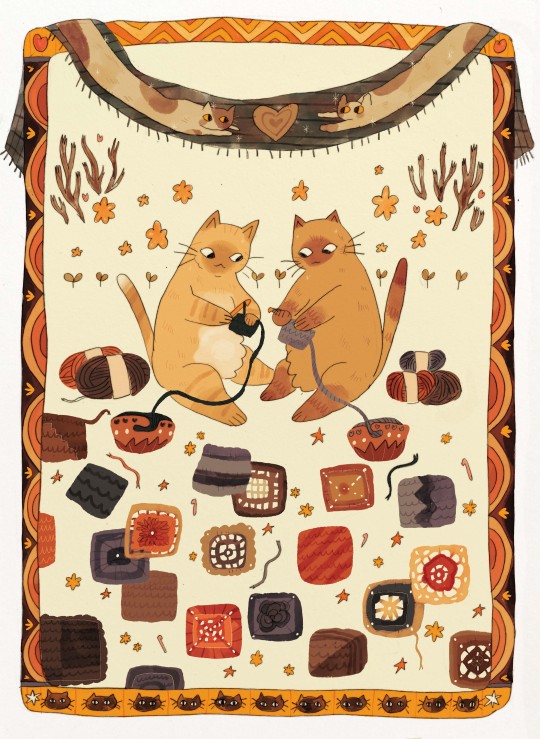
making and weaving and loving! like we have done for millennia!!
#mine#original#ough. hello.#happy new year!!!!! first drawing of th year!!!!!!!!#also LAKSBF 15k followers. hello. welcome#i taught bf how to crochet n hes making a blanket....the irl insp for this piece...#im so proud of these colours....i used an actual real life colour palette..n i think that is th way forward#also . gradient maps my beloved#why have i always refused ur warm embrace.......#dont pay attention 2 the wool bowls okay ive seen a picture of one like once#i do want one however. tho why r they so expensive#its a bowl w a hole in it. relax#ive been listening 2 the silmarillion audiobook as ive been working...i love it sm its like incomprehensible#like. idk what ur talking abt but i love it all th same!!#i tried reading it last year n was like.......okay anyway#rereading gay nuclear disaster book rn....natasha pulley would it kill u 2 write a smut scene#i want 2 see th horrible little scientist man get railed#next book after this is . 1030 pages oaodghsdugd#my goal is to read 50 books this year but i do not think that will happen bc i refuse 2 read books less than 400 pages skjdgbskjd#someone ask me about books. i have so many opinions abt books#okay good evening. i leave u w love
8K notes
·
View notes
Note

hey did you know you're the #1 kudos fic in Fnaf? congrats!
hi this is actually terrifying
#im gonna be real with you#i havent really been looking at hits or kudos because i just pay attention to comments and they get sent directly to my email#last time i remember someone showed me it was on the first page but i kinda#forgot#lmao#anyway remember to read non-dca centered fics to give the rest of the fandom and other creators love#gonna telepathically send this image to 2015 me who was writing fnaf fanfiction on wattpad back in the day
1K notes
·
View notes
Text
bsd fic authors i understand yalls pain SO well right now why is it so fucking HARD to write dazai. like i have a whole fucking spreadsheet dedicated to tireless analysis i have done on my part so i can accurately characterize him but he is such an unpredictable and morally gray character that it's hard knowing his limits and boundaries and where he draws the line for himself.
#i hate when ppl make him out to be a sadistic villain with no remorse. like did we read the same manga 💀#but at the same time he is NOT crying abt all the ppl he sent to the grave. he sleeps just fine at night knowing he committed atrocities#yes he feels remorse? but he isn't like kunikida to weep at someone's grave for failing to save them#and then we have his emotions themselves#dazai isn't emotionless. far from it. he has difficulty expressing affection but yk he finds someone endearing when he trusts them#trust is very important to dazai and is one of the aspects of human emotion that he can fully grasp#but like everything else is in a hazy gray area that he does not feel like exploring. he feels alienated from his humanity bc of this#AUUUGHH can someone help me with character analysis PLEASE#I WASNT PAYING ATTENTION TO THIS MF UNTIL RECENTLY SO I MISSED OUT ON A LOT OF IMPORTANT DETAILS#see i would go and reread a few light novels but like i don't have time for that#and this is for dazai specifically. i am very well versed on his relationships w other charcaters#but just like asigiri himself said: it's very difficult to write dazai and write him WELL#so yeaaa i have a lot of smart ppl following me pls help#bsd#ALSO MY FRIEND STILL HAS NO LONGER HUMAN UUUUGHHHHHH I NEED THAT BACK BC I TABBED IT A SHIT TON#FOR LIKE CONNECTIONS TO YOZO AND BSD DAZAI AND WHERE ASIGIRI DREW INSPIRATION FROM YOZOS CHARACTER FOR DAZAI#THAT WOULD BE SUCH A VALUABLE FUCKING RESOURCE BC I DID SOME ANNOTATIONS IN THEM TOO BUT MY BOOK IS ANOTHER FUCKING STATE#I HATE IT HERE FML
290 notes
·
View notes
Text
literally nobody asked for it, but here's my list of saltburn essays that i've slowly been drafting over the course of the last week which WILL be required reading for anybody trying to engage with me about this movie. my very personal saltburn 101 syllabus just dropped
A Wolf in Deer's Clothing: Saltburn's Attempt at Innocence
an examination of party costumes and our character's last attempts to masquerade as something they're not: felix—an angel, all-forgiving and all-knowing, something to be worshiped; and oliver—a prey animal, prey to class-divide, prey to saltburn, prey to felix.
thoughts about oliver specifically are loosely organized in my #bambi tag
A Midsummer Night's Mare: Farleigh Start as the Ultimate Victim of Saltburn
a farleigh character study, about the ways he was mistreated and manipulated at saltburn, about fighting to stay alive and the scars left behind by knowing when to give in
alternatively titled "QuickStart", may be adapted into a conclusive essay specifically focusing on oliver and farleigh's relationship
The Eye of the Beholder: On Saltburn's Voyeurism & Violence [working title]
how wealth and class pushes the catton's toward the volatile reality of being able to look, but not touch. on desire and the lack thereof, and portraying yourself as an object to be desired
may end up as two separate essays on wealth and aestheticism but i'm pushing toward a conclusive essay about the intersection of the two, which i feel is at the heart of saltburn
alternatively titled "Poor Man's Pudding: A Melvillian Approach to Saltburn's Class", again, may be adapted into it's own essay
Gender-Fluid: A Study in Sexuality and Saltburn's Desire to be Dry
a deep dive into the bodily fluids of saltburn and how oliver upsets the standard of men who are just so lovely and dry. on the creative choice to lean into the messy wetness of sex and desire and the audience's instinct toward repulsion
a celebration of the grotesque and an examination of why we would label it as such
least developed of the four, heavily inspired by @charnelpit's lovely post about the fluids in saltburn
if anybody is actually interested in any of these, i can work toward something closer to a finished piece instead of just bullet points and quotes in a google doc, but mostly this is so i can share my very brief takes on a multitude of themes in saltburn that have been haunting me
edit for people seeing this in the future: all posts about my essays are being organized into my #saltburn 101 tag if you’re interested in following these through to development!
#saltburn#saltburn posting#really desperately need someone to pay me to write saltburn essays all day#or else these will never be more than a smattering of bullet points#and these are only the most developed of the millions of the thoughts that i've had rolling around in my brain this last week#idk if lengthy meta-essays are interesting to literally anyone other than me#but if any of these speak to u and u have thoughts abt them#of course u are welcome to send them my way#i think all of these were born out of either seeing bad fandom takes (ie. everything ive seen about farleigh and oliver)#or rly good fandom takes that haven't been talked about enough like the fluids thing#anyway#oh also if u want any interview clips that back up any of these ideas i have a list thats like a million miles long#and would be happy to dig for any specific things im talking about here#bambi#also also im sorry i kno the colon in academic essay titles is so overused i just love a subtitle sm#i love love love a clever little essay title. titling my essays was literally my favorite part of the essay process in college#saltburn 101
339 notes
·
View notes
Text
I came across a few posts noting that Ed should not have told Stede not to kill Ned Low, which got me thinking...
I don't really agree with that. That entire scene, both Ed's decision and Stede's decision, is complicated with a lot of different things, but none of them quite so much as the shared knowledge, and pain, of both men. (Yeah, I'm not capable of not writing an essay.)
Stede is the only one who knows about Ed's father. Ed tells himself-as-Hornigold that he never told anyone about killing his father, and Hornigold reminds him: "But you did, though, didn't you? And he left you." Stede is also the only one who knows Ed really doesn't kill - that he, by his own admission, outsources the killing to others. The murder of his father is the center of Ed's self-loathing, and is the thing that he relates, in his conversation with Hornigold, most directly to Stede leaving him.
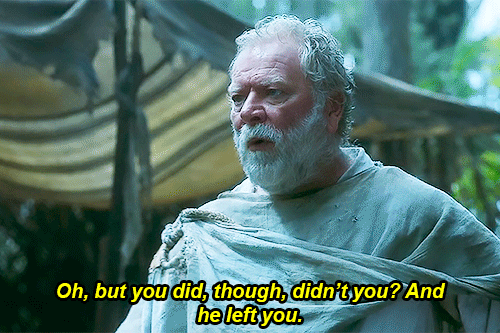
Low's insults don't affect Ed much; he's heard them before, he knows what's behind them. But Stede has been watching Low hurt people and things he loves - Ed, the crew, the ship itself - without being able to do anything about it. He successfully uses his "people positive management style" to get Low's crew to turn on him, but the problem of Low himself remains and cannot be eliminated in the same way.
Low calling Ed a "lowborn dirtbag" is what finally makes Stede snap, and one could argue that his response is more or less automatic. It's certainly emotional. There's nothing he could say to Low to put him in his place, as he did with the aristocrats in "Dressing Well." It wouldn't work; he cannot meet Low on a level playing field and use the same weapons against him, because Low's whole thing is being a bully and Stede is not a bully. Everyone, including Ed, is surprised when Stede actually draws his sword. But by the time he's done it, there's no going back.
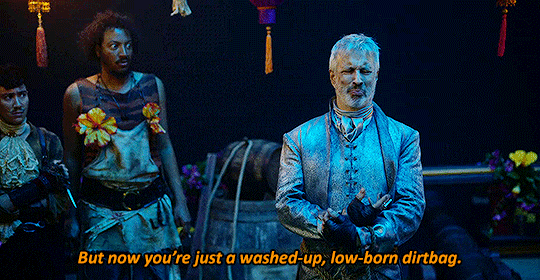
Low obviously reads people quite well, and like many bullies he can suss out the places that will hurt others the most - he knows that torturing Stede will hurt Ed more than torturing Ed. He knows that insulting Ed will hurt Stede more than anything he could say to Stede himself. And he hits on Stede's fears about his masculinity and especially Ed's feelings about him. Low is another in a long line of bullies (Nigel, Chauncey, his father) from Stede's class, and he manages to hit exactly the sore spot, the fear that Ed only loves Stede because of his "bumbling amateur status."
Stede absolutely believes the things that others say about him. In the moment, Stede reads Ed's statement not to kill Low in exactly the way that Low wants him to - as a desire to keep him docile, pure, a pet. Not a real pirate, not a real man. He struggles with it - having gone so far as to hold Low at swordpoint and to force him onto the plank, it's hard to back down. His crew egg him on - Low does indeed deserve to die for what he's done. But when Stede kills Low, to the cheers of the crew, no one but the audience can see his face - the horror and shock at what he's done, as the memories of his childhood shoot across his mind.

As soon as Stede's actually committed the murder, he realizes the true meaning behind Ed's words, and it's this, combined with the shock of having truly, directly, and deliberately killed a man, that sends him running back to his cabin. Stede sees himself as a child, the boy who just wanted to pick flowers, splattered with blood from "men's work." He cannot go back now; he's made a choice, and he murdered a man. He does exactly what he's done each time his own shame has become too much for him, and hides himself.
But when Ed comes to his room, he directly relates it to his own trauma - "I was a wreck after my first kill as well. Well, it was my dad..." He's there not to shame Stede either for his violence or for his self-perceived weakness, but to be present for him.
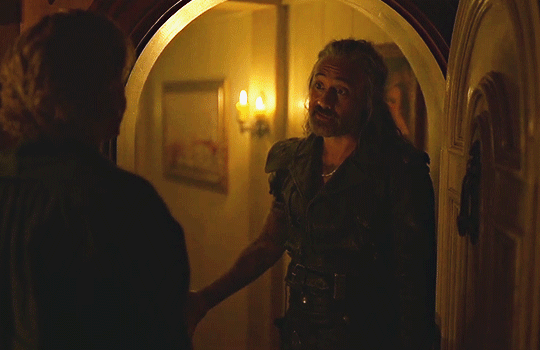
That traumatic past is part of what unites them. Stede was forced to witness death and was told it was what men do; Ed committed murder, and has been haunted by it ever since. Ed sees the potential of the same thing happening to Stede - being so overcome with guilt and shame at actively committing murder that he suppresses and remakes his self to avoid coping with the horror of what he has done. It doesn't matter that Stede is a grown man and Ed was a child; Ed knows how badly it can warp someone, and Ed knows better than anyone how the abused child becomes the traumatized man. He tries to warn Stede first, recalling their past, and then he shows up for Stede in a way that no one did, or could, for him - not until Stede himself extended his hand and said, "I'm your friend." Ed is there at the door within minutes, asking if Stede is OK, offering his support, not letting him hide alone if he needs someone to hold him.

I've said a lot about the progress from the moment Ed appears at the door to the moment Stede closes the curtain here, but again I don't think it should be read as Stede proving his masculinity or Ed feeling sorry for him. Sex is not being treated frivolously here, either by the show or by the characters. It is an outpouring of pain and grief and deep, intense love between two men who understand each other's suffering at a fundamental level, who have shared things with each other that no one else knows, and who see all of each other, the darkness as well as the light.
#ofmd season 2#ofmd#our flag means death#gif#stede bonnet#ed teach#edward teach#rhys darby#taika waititi#calypso's birthday#gentlebeard#ned low#ofmd meta#blackbonnet#ofmd stede#ed x stede#yes i included the kiss again because whatever i do what i want#someone pay me to write a book about how this show picks apart toxic masculinity and male trauma and i'll do it
227 notes
·
View notes
Text

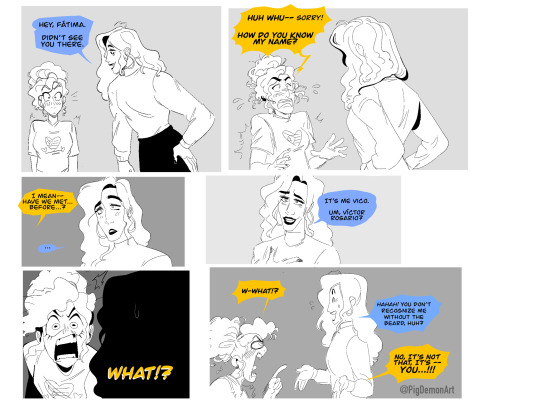
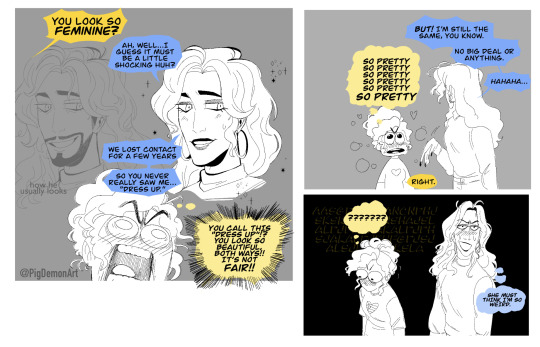
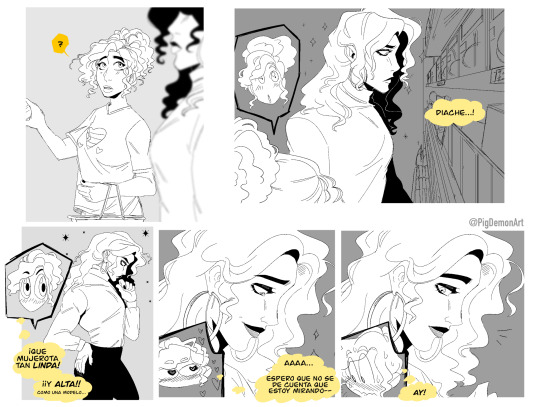
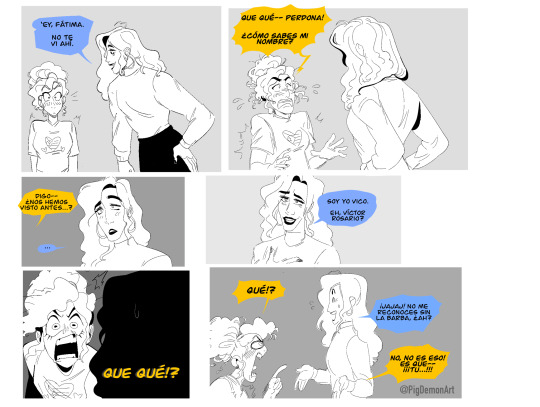
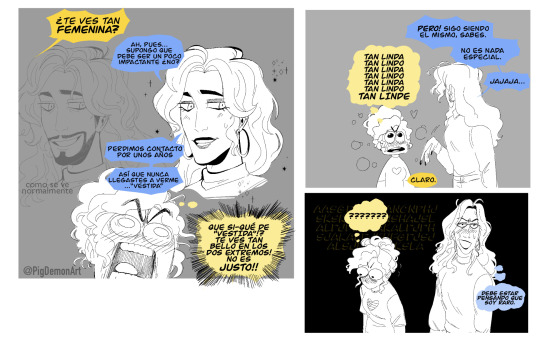
Guau, ella es bisexual, i didn’t know that!
Vico and Fátima being little disasters, as usual. In ENG and SPA of course, tho imho the dialogue is always a little funnier in Spanish B^]
Imagine Fatima’s surprise when seeing that the captain of the baseball team from her old high school, is now being cunty at the supermarket???? The nerve. The audacity.
In reverse, imagine the horror of being openly queer but NOT knowing if the girl you’re interested in is Aware or even remotely Okay with your
💖gender thing.💖 How to even begin to explain???
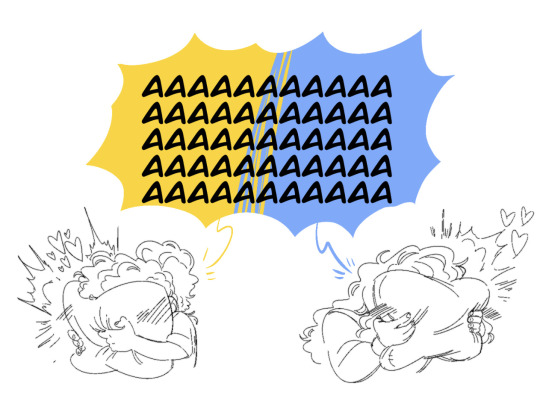
Patreon | Ko-Fi
#los brujos#victor#fatima#comic#someone pay me to write and produce queer romcoms#i think i would do relatively ok#anyways my fav here are fatimas expressions#and of course fatima trying to grapple with what pronouns to use for Vico#lindo or linda fuck it — linde!!!#spanish gendered adjectives and nouns are ass but can at least be used for storytelling purposes
366 notes
·
View notes
Text
When you have an idea for something you want to write but no time to actually write it, even on the weekend.
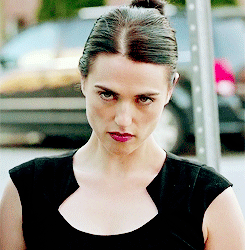
#lena luthor#katie mcgrath#supercorp#supergirl#it will be a little kinky#but a fun kink i hope#someone pay me to write fic#oh wait that's illegal#nm
111 notes
·
View notes
Text
Of fandom, age, and David Tennant being our own personal Time Lord
I read the fantastic post that @davidtennantgenderenvy wrote about David Tennant and aging (if you haven’t yet read it, go for it!) and, as a fan who is closer to DT's age range than to what seems to be the rest of the fan base's age (yeah, being well over 40 is A THING), I had an interesting mix of ideas and emotions. I was going to just reblog her post with some of these musings, but when this started getting longer (and I started searching for bibliography, ha), I decided that I was not going to hijack her post, but rather cite it (and reblog it on its own right, really, read it). I should say that this is a long essay, and it comes peppered with references to one of my preferred fields of study (but I make it light and fun, promise).
Becoming an “old geek”
The first time I came into the idea was when I found a thirst TikTok with that very nice audio that goes “I think I need someone older…” and clearly, the thirst was there, but also… David is 8 years older than me, and when you are 45, thirsting over someone who is 53 doesn’t feel as “edgy” (and thinking about “needing someone older” starts verging on thirsting over people well over 65, which is absolutely fine, but a very different category over all for the rest of TikTok). So yeah, it was weird. You see someone who you feel is "in your range" and everyone is calling them "old"… And you start thinking about aging, inevitably.
Of course, I "don't feel old", but most of my friends are younger than me, and I'm the oldest person in many of my "fun activities". Take, for example, my lightsaber combat team, where every sponsorship is pitched to people under 30, and you should be training at least twice a week and following a strict diet to reach the expected “competitive or exhibition” level (enter the “old lady” who is taking this training just for fun, who needs to take care of her joints and who is not going to be invested in becoming Jedi Master General or anything of the sorts in the near future). Or we can talk about the expectation about fandom in general being a “teenage phase”, and thinking about everyone who still is into it actively after certain age as “immature” or “quirky” at best (hi, mom! Hi, work colleagues! Hi, students!).
Society, aging and social constructs
Of course, this has a lot to do with societal expectations. For almost 80 years, popular culture has been built around "youth" and "young people": before rock & roll, most things (music, clothes, movies, art in general) were targeted to “adults”, and you were expected to be “a functional adult” since a younger age. There was a seismic shift in the way popular culture was built when consumer culture decided to see and cater young people: trends became shorter, being “hip” was desirable, staying younger for a longer period was a nice aspiration (a good, light reading to get a deeper view around this is “Hit Makers” by Derek Thompson. It is written for marketers, but that makes it an easy historic overview and I like that). This has a lot to do with the change of our view about old people, too: while being old 100 years ago (yup, 1924 still fits the bill) made you “a respected elder” and you were expected to be wise, to know best, to be the voice of reason and an expert, nowadays not even us older people like being seen as “old” or “older”.
Frequently, culture becomes entrenched in binary oppositions. The binary opposition between “young” and “old” is… well, old! And while the opposition is sustained, the meanings around it change over time (that’s what the past paragraph was about, really). If in the 1940’s being old meant “mature, respectable, wise, responsible” and being young meant “inexperienced, immature, foolish”, after the 1950’s those meanings shifted a lot: being young became “fun, interesting, in the now and in the know, attractive”, while being old was about being “boring, dusty, passé, uninteresting, dull”.
In reality, being young can be a mix of all of these things (inexperienced and fun and foolish and attractive), and being old can be, at the same time, being responsible and wise and a little dusty and dull, because that’s life *shrugs*, and the wonder of lived experience is that, even if we simplify it, it is complex and rich and sometimes contradictory in itself: we can be old and foolish and interesting and boring, or young and dull and inexperienced and attractive. But, as we need to make “social sense” of things, simplifying them is… easier. That’s why we build stereotypes, and why we use them! We need to have a “base” of signifiers to build upon, so we usually take what we have on our environment and run with it. If you find this idea interesting, welcome to the world of cultural semiotics! *takes her Iuri Lotman picture out of her pocket and puts it on the desk*
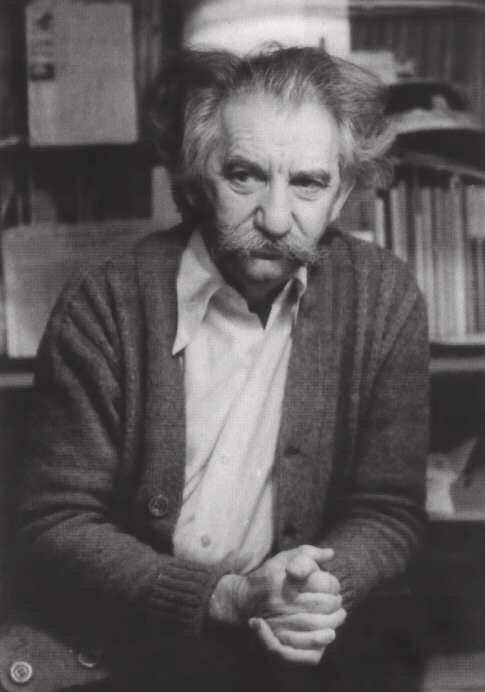
(Iuri Lotman, people. He is my "patron saint").
Pop culture versus “real culture”
Another cultural opposition that piques my interest in this area is the notion of “pop culture”, of course. It is opposed to “real, serious culture”, the sort of thing that everyone expects "older, mature people" to enjoy. In the sixties and seventies, there were a lot of studies and writing about "high brow" and "low brow" culture, trying to keep this distinction between "things that make you familiar with the now, but have no intrinsic value" and "eternal things that cultivate your mind, soul and spirit".
Evidently, if you ask me, this is a whole load of horse manure: probably useful to fertilize other things, but with little intrinsic value on its own. My main point is not dolphins, but the idea of culture: historically, it has used to mean a lot of things; from the notion of (exactly) fertilizing something and making it grow to make it come to fruition, to the hodgepodge of practices that a social group creates when they are together and are trying to make common sense of things.
I like the latter better (that is the one I’d ascribe to if this was The Academia TM, but this is tumblr!), but another popular definition, which comes from the Illustration and has been quite prevalent, is the notion of culture as the set of cultural practices that make you a better, more intelligent, far more educated person. For example: if you want to have real culture, you have to read Shakespeare and know what a iambic pentameter is, rather than watching “10 Things I Hate About You”. You must read real books, not listen to audiobooks, and “real books” should be written by “serious authors” like (insert old white Western European or American cis men, preferably born before 1960).
Here comes the notion of “cultural canon”, grinning widely. Yup, that set of practices becomes an expectation of what and how you should experience any area of the human experience, and they become a sort of “nucleus” of the whole experience, with people playing “defense” around them and culture shifting all around and sometimes across them. This is not exclusive to “high culture”: Have you ever heard about “gatekeeping”? Yeah, same fenomenomenon (Shadwell, of course). Whenever something gets this “shape”, it becomes a “norm”, the “common” thing, the “rule” if you participate in that set of cultural practices.
As every cultural set of practices tends to generate its own “canon”, they also have a lot of practices surrounding it, which are ever changing, shifting, learning from new and old practices, and redefining what everything means in their common/shared space. For example: Neil Gaiman, my beloved, was part of the “comics” frontier when Sandman first appeared, but as he and Alan Moore (yeah, I know he did it first, but Gaiman is my study focus right now, so let me be) and other very talented and interesting people started creating fascinating stuff that hadn’t been done, and they found people who loved it, they not only redefined the world of comics, but became part of the new canon themselves. And then, Neil’s presence in the world of literature and fantasy became widespread and recognized and then revered… And then he is doing it again by adapting his own work to a streaming platform in a serialized way… I hope this explains why I’m growing an obsession with studying Neil Gaiman as an author who crosses through different media: a transmedial auteur, an anomaly in his own right. But that is not an essay for tumblr, but a thesis, one that I don’t know if I’d ever have the time or mental resources to write (being a runaway ex academic with ADHD who works on their own is hard, people). Besides, this was about aging and David Tennant, so let’s cut this tangent short and start talking about our Time Lord and Savior: David Tennant, the king of frontiers.
David Tennant as a Frontier Lord
David Tennant is another fascinating case in this sense, mostly because he is an actor who has been able to build a whole very impressive career through crossing symbolic frontiers. Through his massive filmography (161 roles just for screens, as registered in IMDb) and his stage career (I love this gifset for this exact reason), he has acted his way through almost everything, from classical Shakespeare to improvisational comedy, from procedural police drama to wacky fantasy sci-fi. This has a lot to do with his personality (he loves acting, he decided to pursue acting as a career thanks to his love for Doctor Who, but he is also smart and inquisitive) but, as it happens with a lot of “frontier figures”, it also has a lot to do with “unpredictable” circumstances: less of a strategy, more of an instinct.
David has talked many times about how his impostor syndrome made him feel, for the longest time, that he had to keep accepting roles, because you never know if there is going to be another one after. He is talented and open and curious (this is quite a good interview about his perspective), but this… anxiety? meant that he had also lower quandaries about saying “yes” to roles and projects that were “less consistent” with a typecast (which has been, for the longest time, one of the main strategies to build an acting career). Yeah, he has some defining characteristics that make a role “tennantish” (I’m not starting that tirade here, but yeah, you know that almost fixed set of quirks and bits), but he has also worked his way through many different genres, budgets, styles and complexities. And he has usually been as committed and as professional in a big budget-high stakes-great script sort of situation, as he has been in a highly chaotic-let’s see what sticks-small scale project.
That can be correlated by the way he talks about “acting advice”. “Be on time, learn your lines, treat everyone the same, never skip the lunch queue”… Acting is a job, and he treats it as such. Yeah, he looks for interesting projects anytime he can, but the “down to earth” attitude about it is, once again, not-usual, not-common: pure frontier. Then, when David talks about his own self (specially at a young age), he is pretty clear about his “outsider” or “uncool” status (this interview is fantastic), and how strangely disruptive it was to become not only recognizable, but cool and sexy and… everything else, thanks to Doctor Who. He went from living in the frontier to being put in the canon, but he is still, at heart, a person who is more comfortable not defining himself by that “expected” set of rules.
Him being a very private person, who insists on having a family life that seems, form this distance, stable, loving and absolutely un-showbiz just makes the deal (and the parasocial love and respect) easier to sustain; as does his openness to talk about social and political issues that interest him (passionately, again; against the norm for “well liked celebrity”, again). His colleagues also talk wonders about him, mostly because he is this sort of down-to-earth but also passionate about his craft and easy to work with. Again: not the “norm”, not the “rule” of being such a celebrity.
Many of his fans (should I say that I’m one? Or is it obvious at this point?) find this not only endearing, but comforting: he is a massive star, who has acted in a lot of terrific roles in huge productions… But he feels, at heart, as “one of us”. But he is, also, a well-respected thespian, a Shakespearian powerhouse, an international talent. He lives in a very authentic, but very unstereotipical frontier. And he seems happy about that and has made a career from it. Extensive kudos and all the parasocial love and the amateur-actress mad respect for that.
I should mention, just in passing, that a “natural” archetype for this characters that traverse frontiers… are tricksters. Think again about the “tennantish” characteristics. Here goes another essay I’m not writing right now.
Aging: The Next Frontier
This takes me to the original post that inspired the essay: living in a culture where the “norm” is “being young and famous is a desirable aspiration”, we have a fantastic actor, at peak of his craft, who is in the heart of middle age (past 50, nearing 55). Not only that, but he is an actor with whom at least a couple of generations have grown older: from the ones who feel him as “our contemporary” to the ones who grew up looking at him (like Ncuti Gatwa!).
David, being the frontier person he is, has been navigating this transition in a very “unconventional” way: he came back to the role that made him iconic (The Doctor, now with more trauma!), is starring in another fantasy series about middle-aged looking ethereal beings that at times is an adventure thriller, at times is a comedy of errors and at times is a romcom (having another beautiful trickster of a man as his co-star… There goes another tangent that is an essay); he is playing one of the quintessential Shakespeare roles for middle-aged men (Macbeth), and is, seemingly, having a lot of fun doing a lot of voice acting for animation roles (if you haven’t watched Duck Tales, you’re missing a whole lot of fun, really).
Traditionally, middle aged actors navigate that period of their career trying to reinforce their “still young, thus a celebrity” status (for example, doing a lot of action-packed movies and keep doing their own stunts while seducing women 20-30 years younger than them), or strengthening their “prestige thespian, so now a real culture person” position (fighting for more serious roles, going from comedy to drama, or working their way into The Classics©). Sometimes, they face the internalized societal expectation by also becoming a shipwreck in their personal life (yeah… the stereotype of “getting divorced, having an affair with someone half their age, getting another red convertible, getting in trouble…”) because we don’t have a good “map for aging responsibly” yet as a society. We have been so focused on youth, that we have forgotten how to age.
Again, switching to the personal experience. I was raised as a female-shaped person (yeah, being queer is fun), so part of the experience of growing (and then growing old) has been closely related with that concept from the female point of view. I decided, pretty early on (but not so much, probably 25 years ago), that I wasn’t going to conform to the norm… And that included aging naturally. When I found my first white hair, it was a shock (I was 21 or 22), but I had already seen my father fighting his own hair being white since forever. I decided it was a loss of time, money and effort… And the judgement from people in my generation and in the one that preceded me (my mother, my aunts) was stern and strict: “it will age you, and it will date us. You shouldn’t do that”. Men could do it, given the right age (being over 50) but women must not. Same with wrinkles and sagging and gaining weight and getting “pudgy”. But when men grew older, they needed to make a “show off” of their ability to seduce, to “still be a man”. Aging, then, was undesirable by any standard.
As me and my peers have grown older, and my hair has gotten increasingly silver, there have been women that come to me saying that “I look great” and “they wish they were as brave as me”. I would like to state in front of this jury of my peers (hi, tumblr!) that the only bravery it took was deciding, somewhere between my twenties and my thirties, that I wanted to be as myself as I possibly could, so no bravery at all, just the same lack of understanding of social rules that took me to become interested in… you guessed it, cultural semiotics. We’ve come full circle with this. Now, let’s finish talking about what it means for an aging fan to have an aging star to look up to, shall we?
David Tennant as a cultural Time Lord
I am pretty sure that he wouldn’t have chosen this role for himself (as he wouldn’t have chosen being a massive star just by playing his favorite character and being so talented and charming), but he is, as Loki would say, burdened by glorious purpose. Being “the actor of his generation”, and him crossing so many frontiers with such ease and grace, without even thinking about it too hard, just because he is a hard worker and likes to try new things and is just so good at what he does put him in the exact cultural crossroad for it.
He is not in a sudden need to “resignify himself” as anything: he has already shown his very flexible acting muscles through his very long career. He is not bounded to “keep his public image relevant”: he likes to have his personal life clearly separated from the spotlight, and being married to the brilliant and funny Georgia, who herself grew up with a famous father, so she is no stranger to staying sane and in control in the eye of media, and who manages their social media presence with a good mix of humor and well-set boundaries.
Therefore, he is in a moment where he can (and probably will) chose to do whatever he likes. And he has the public support to do so: he is prestigious and respected, but likes to make fun of himself and is not self-important; he has a lot of awards, but he is also a very likable person with whom most people in the industry enjoy working. And he is up to do a lot of things: heroes, villains, morally grey characters; romance, drama, thriller, fantasy, sci-fi, procedurals, historical fiction, classic plays, silly parts, voice acting… We are going to see him aging on screen and stage, with no playbook: the playbooks were written for people that certainly are not him. And I have some evidence to prove it.
He is starring in a groundbreaking series (yeah, Good Omens) where the protagonists are two middle-aged looking entities, full of queer relationships, written by another trickster. This series, in an on itself, is a showcase for characters that are rule breaking in many ways: in the narrative, by being hereditary enemies who are inevitably linked to one another by a loving bond that may or may not be romantic, but that has been in the making for 6,000 years; in representation, by having the protagonists being represented by a couple of middle aged actors who are “not serious” and “not action” coded, in a role where they are delivering romance, banter, intrigue, joy and a whole other range of emotions that are “not your stereotypical” middle-aged male-lead coded.
He also delivered the baton on a relay race with Doctor Who: he came back after almost 20 years, to bring back the generation who grew up watching him in the role, and deliver us into the arms of Ncuti Gatwa’s 15th Doctor, with the promise of taking a rest and working on getting better from all the trauma The Doctor has endured in 20 years Earth-time (which, as any Doctor Who fan knows, account for centuries of trauma in Doctor’s time). Not your usual Doctor Who Anniversary cameo, but one built to deliver some zeitgeisty emotional health promises that made the specials feel… healing. At least, for some of us.
Even when it wasn’t the hit series it deserved to be, his Phileas Fogg in “Around the World in 80 Days” is also a great delivery of an unconventional middle-aged protagonist, who goes from meek and scared and too worried about societal norms, to a lovely, tender, slightly awkward and daring person, with friends half his age who look at him but are also his peers (another kind of relationship that is not very frequent in media).
And, with all fearlessness, he has played a lively old duck in Duck Tales! Scrooge McDuck has never been a middle-aged character: he is, quite openly, an old gentleman. An adventurer, quirky, with a lot of spunk… but also quite clearly an elder to Huey, Dewey and Louie, and obviously older than Donald Duck (who is also not a young adult himself!). When you watch that series, and if you have the opportunity to catch any glimpse of him behind the scenes while recording the part, you can feel the joy he got from playing the part (and he has said time and again that he IS Scrooge McDuck, so it will become his “recurring bit” for the future).
Hopefully, David (and some other actors and actresses, for sure) will dare to build that new “aging publicly without making an arse of myself” playbook, and I (and I can imagine, many other fans in our middle age, but also fans that are right now leaving behind the “young adult” stage and becoming “adults” fair and square, and others who will arrive to this place at a future time in their lives, so I hope) will be there to bear witness, support, cheer… and learn from the model. Because that’s what fandom is about, but also because that’s how culture itself gets shaped and changes, continuously. And that is exciting and a little scary, and that’s why it is better if we do this together.
And I'd love to imagine diverse (in the full sense of the word) role models for this process and this playbook, too!!!
If you read all the way through this, I'm very grateful, take a cookie, have a gold star and suggest names for our aging interestingly role models on the "non-white-male" side of things!
Class dismissed!!
#david tennant#aging#aging gracefully (or not)#long essay#long post#cultural studies#cultural semiotics#I need someone to pay me for writing this sort of stuff really#when I said I was writing again I meant it#this was 6 pages long in Word#and it includes references#look at my (written) child#the doctorate in cultural studies would never#neil gaiman
107 notes
·
View notes
Text
soooo in order to keep y'all from sitting on the edge of your seats, i decided to put together a bit of a february road map. uh. such as i'm capable of having one, barring me being thwacked in the head by an idea i simply MUST get out, ahahhaa!
feb 14: leo valentine's day one-shot
feb 19: super secret project that definitely isn't a present for my roommate's birthday
feb... sometime: symphony 24 (will likely be before the other dates, depends on how quickly i can get them finished!)
feb 27: ...dont worry about it
late feb: donnie didn't mean to do that but well he's here now
late feb again, if i have time fingers crossed: symphony 25
march 1: mating season event
#text tag#dates are post dates not start working on dates. for clarity hahaha. i've started working on the leo one already#fingers crossed i'll have it finished...tomorrow? maybe day after? then i can start working on roomie bday thing I MEAN Definitely Not That#which... if i get finished quickly... means symphony 24. Fwah! so many irons in the fire!!!!#quick. someone pay me to write fanfiction so i can quit my job and write all day!!!!#EDIT I FORGOT ONE
75 notes
·
View notes
Text
man I'm just gonna say that it's incredibly fucking weird to walk onto a stranger's blog, project your own predatory age headcanons onto a character with no canon age, and then decide that means the blogger condones it.
like?? my dude?? the only person talking about that is you because it's your headcanon?
"you're bad because I think of this ageless character as a 30yo being paired with a teen" well I sure goddamn don't and I didn't need to hear that shit! it's not only extremely inappropriate, it's creepy as fuck! so like, maybe do some self-reflecting on why you decided that a stranger should abide by your headcanon, and maybe also stop doing that.
#RARE SHEA VENTPOST™️#disclaimer that im a Tax-Paying Adult™️ and know that this doesnt matter in the real world (thank god)#but yes this is about Ghiralink#imagine being so miserable that you see someone writing post-game scenarios with adult characters and you go#'hmmm seems p*dophilic i better condemn them'#idk what else to tell you at that point just unplug your router#chronically online take please go seek real world community and take a year long hiatus from tumblr dot com#god why else do you think i made link and ghirahim turn to the camera like 'wow we are in our early twenties'#because some ppl online insist on being horrifically obtuse#i guess ill shut this post down if it gets too annoying but i decided i wanted to be Unwise Online for a min#additional disclaimer that recent Ghiralink Discourse Murmurings did not happen directly to me
129 notes
·
View notes
Text
i do have it in my bio but just letting yall know again that im 23
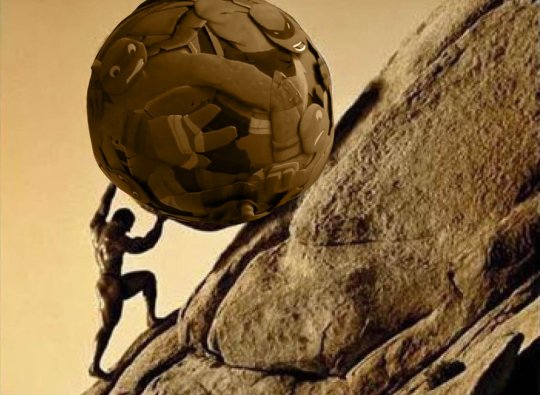
#i just read that someone thought i was like 16#guys i have a job and pay bills and do my silly man in his midtwenties tasks#i think its because of my silly brain or because i love using emojis when i write but guys im not a minor 😭#ig be mindful of this when interacting with me????idk#fer talks
109 notes
·
View notes
Note
What do you think as Hermione's career would be post battle of Hogwarts? To me her being minister for magic really doesn't make sense. She does not have patience or tact to wade through murky waters of politics 😭😭
So hard to say! The Trio are so, so young when we leave them, I find it almost impossible to project their futures farther than a few years out. The job that suited me at 17 would be radically unsuited to me now. That's why of all the Trio, Ron's ending strikes me as the most realistic — he jumps straight into the save-the-world business again, burns out, realizes he's actually Done The Fuck Enough, Thanks, and pivots into a low-stress career where he gets to see his family a lot. Feels accurate! The others are weirder to me because they do seem to just... pick a lane and stay there.
With Hermione, you could spin her a couple ways. You could say that she leans into her bookish side and does research or teaching, which is not my preference for a couple reasons (namely, I don't think Hermione would like academia as a profession; she finds her classwork interesting and enjoys intellectual validation, but she'd be stifled and wasted in a DPhil program, and she'd be infuriated by the administrative politicking of your average higher-ed faculty). You could say that she gets disaffected with politics and ends up as a barrister or a lobbyist of some kind, but if anything that requires more political finesse, because you don't actually have institutional power, you're just handling the people who make decisions and trying to persuade them of your goals. This is not Hermione's preferred method of influence. She's not even particularly good at persuasion, she just happens to be smart enough (and right often enough) that people take her ideas seriously.
Or you could say her brashness fades with the years into a softened flavor of tell-you-like-it-is honesty, which some politicians actually do successfully trade on; as we see in British politics today, you don't have to be all that charming or clever to get ahead, you just need to be really driven and well-connected (which Hermione completely is; she fought shoulder-to-shoulder with the first postwar Minister and her bestie, the Literal Messiah, runs the Auror Office.) But I don't know if Hermione especially wants to be Minister, after the war. She's just watched years of horrendous bureaucratic incompetence plunge the country into a violent civil conflict. She's had not one, but two Ministers of Magic try to bully or shame her friends into complicity with fascism. Her view of government is... likely extremely dark.
But Hermione also isn't the kind of person who sees her life as a quest for happiness. Babygirl has a savior complex that makes Harry look selfish. (She basically kills her parents — yeah, obliviating is a form of murder, #changemymind — "for their own good," and justifies every batshit, vindictive, mean-spirited move she ever pulls on the grounds that it "helps" one of her friends.) She is a mean, lean, dragon-slaying machine, and she needs a dragon. After Voldemort, the Ministry is the no. 1 threat to muggle-borns and non-wizarding Beings. As a war heroine with basically infinite political capital, I'd be surprised if she didn't try to do something there. That said, Hermione is so vivacious and dynamic that she could potentially grow in a hundred different directions; it's possible that all of this, while true of her at 18, becomes completely inaccurate by 22. That's why I'm not too fussed about any particular fanon interpretation.
#greenteacup asks#sidebar: I know Minister “of” Magic is an Americanism but mea culpa#Someday I might actually bite it and pay someone to britpick Lionheart but I can't do it now#because I have a ban on editing published fic unless it's finished. Otherwise I'll never get around to writing the actual ending#I have a Process#is it the best process? likely not! but it makes the words go. so here we are.#I also think the fact that JKR is Gen X makes a difference here. careers worked differently in the 80s and 90s than they do now#i.e. we have the gig economy and a lot more mobility and EXPECTATION of mobility in your early life#that means career changes & professional pivots through your 20s and 30s are increasingly normal#and in fact have always been normal — but the image of the 'true' or 'ideal' career has changed#so we look at those careers and go hm. really? none of them changed?#none of them even went to uni? do wizards... just not?#but again. I believe the epilogue was written almost completely without consideration as to what happened between the BOH and then#I really believe that JKR did not know what happened to Harry except a wedding and 3 kids. because that was the whole point#I don't think she even knew what his career was when she wrote that scene#It existed to marry everyone off and do a quick munchkin headcount#because of the understandable temptation as an author to keep your hand on the wheel. but it didn't even matter!#the epilogue changed NOTHING! it was the most useless chapter in the series! I just — GOD#you can absolutely accuse me of being sour grapes about my ships getting nixed. I AM sour grapes. I AM a hater.#AND I have plot/theme/craft reasons for disliking it.#I'm not objective. I just want credit for being a sophisticated hater. my grapes may be sour but they're still artisinal.
35 notes
·
View notes
Text
okokok hear me out I've just seen a tiktok pushing remus lupin as James Acaster on taskmaster, therefore I'm thinking what if someone wrote the marauders in taskmaster, maybe with regulus as the taskmaster??
but also who would be little Alex horne (the guy that just gets bullies for the whole show and is also very gay with the taskmaster) because me personally I'm thinking james or have evan as the taskmaster and barty as Alex horne
someone please write this I'm begging I would literally pay for it or if anyone knows a fic please send it to me
#remus is literally james acaster even down to the swearing problem#like i might make a post on james acaster moments that remind me of him#theres so many possibilities with please i just want to read about my comfort characters doing stupid shit#someone write this im begging#i would literally pay for it#the marauders era#marauders era#the marauders#marauders#dead gay wizards from the 70s#marauders fic#remus lupin#sirius black#james potter#regulus black#evan rosier#barty crouch jr#i need to see more of them not being sad and just them being chaotic little shits#no need to even come up with new challenges literally just use the ones from previous seasons#specifically series 7
33 notes
·
View notes
Text
How come I can write a 50k word fanfic, but writing a 1250-character fic summary has me crumbling?
#can anyone relate to this?#I've changed the summary on my WIP fic like 5 times already#can I pay someone to write it?#I can’t do it#should I make ChatGPT write it?#can some ao3 writers give me advice?#jujutsu kaisen#satosugu#jjk#satosugu fanfic#ao3 fanfic#ao3 writer#fanfic#ao3#fanfic writing#jjk fanfic#writing fanfic#archive of our own#ao3 meta
32 notes
·
View notes